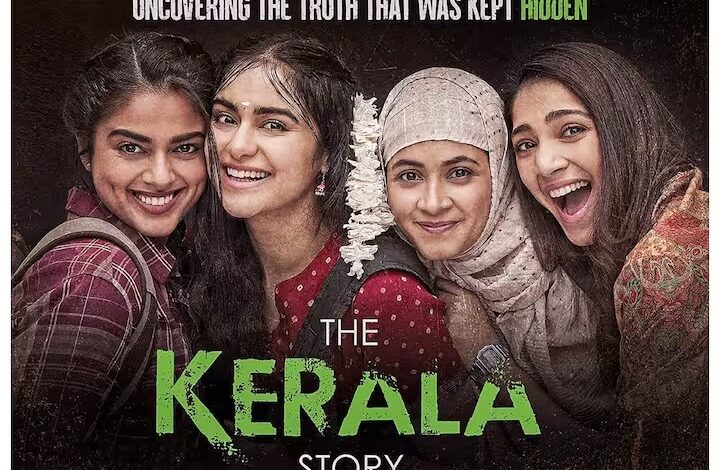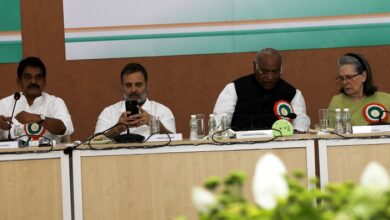‘Kerala Story’ is a hate story, all cooked up: West Bengal Government to SC

Opinions And Public Reviews
The Supreme Court on 18 May lifted the ban on The Kerala Story in West Bengal, a state in eastern India. The film, which got a commercial release on May 5, had been banned by the Bengal government in order to maintain peace within the state.
Defending its ban on “Kerala Story”, film portraying conversion and manipulation of Hindu girls into Islamic State jihad, West Bengal government told Supreme Court that the script of film was based on manipulated facts and laced with hate speech.
Bench presided by the Chief Justice of India D Y Chandrachud hearing the challenge by film makers to ban had asked the state government that when other states were running the shows, why West Bengal had to ban it in the state.
In a detailed affidavit filed in the apex court, West Bengal government enumerated several “hate” driven confrontations happening over the film between two communities across various towns and districts of the state.
“The said movie is based on manipulated facts and contains hate speeches in multiple scenes that may hurt communal sentiments and cause disharmony between the communities which will eventually lead to a law and order situation, as has been gauged from the various Intelligence received by the State government over a period of time,” the West Bengal government said in its affidavit.
“Therefore, to maintain public order and for the benefit of the general public, the Government of West Bengal exercising its power under section 6 (1) of West Bengal (Cinemas) Regulation Act, 1954, imposed a prohibition on exhibition of the movie. That the prohibition on the exhibition of the movie is ordered considering the safety and security of the people, as per the Latin Legal maxim, salusrepublicae supremo lex which means safety of the State is Supreme Law,” it contended.
In its 67-page affidavit, the West Bengal government relied on several communications between the state home department, senior police officers and local intelligence inputs which are excerpted thus:
“Initial trailer claimed that 32000 girls were converted into Islam and were taken forcibly to Syria. Later on however movie makers clarified that movie was story of three girls only… “
“The basic plot of movie is: Three non-Muslim girls – Shalini, Nimah, Gitanjali comes into contact with a Muslim girl Asifa in hostel. Asifa is working for an organisation that wants to get the girl converted into Islam by any means and then send them to Syria to convert the non-Muslim girls to Islam, Asifa uses certain tactics. Firstly she
does slow indoctrination by telling these girls how their religion and their godswon’t protect them. In fact she makes fun of Hindu and Christian Gods. Secondly, Asifa sends some boys when Shalini and Gitanjali go out for marketing. The boystease them and resorts to molestation. When these girls come back to hostel, Asifatells that they were molested because they didn’t wear hijab. So the Shalini and Gitanjali start wearing hijab. Thirdly, she gives certain drugs to them to feel happy when ever they are depressed. Fourthly, she gets both Shalini and Gitanjali introduced to the boys who she tells are her cousins. Both girls fell into love with two boys and also develops physical relation. Shalini becomes pregnant. Now,
Shalini is told that boy can marry her if she converts to Islam. So after lot of persuasion, she adopts Islam. However after that the boy disappears. Now Asifa takes her to a moulvi who persuades her to marry another boy. Shalini marries again and go to Sri Lanka for honeymoon. There she comes to know that she would have to go to Syria with her husband via Afghanistan. She delivers a baby girl in Afghanistan, is tortured and gang-raped with other women like her…”
“The movie thus depicts only one picture of Islam, which is Radicalised. And the message that movie ends up leaving to the audience is that Muslims need to be doubted as friends, as hostel mates. During dialogues, one faith is pitted against the other faith… “
“The movie has already become a political agenda as Hindu Rightist group talking up to them to encourage non-Muslims to watch the movie in large numbers and by referring to the movie they are claiming that love-jehad is a reality and need to be fought… “
“It must be submitted that Kolkata is communally sensitive city and in last three years a number incidents with communal overtone has taken place. In light of all this, it is submitted that the screening of movie Kerala Story will be detrimental to communal peace and harmony. It has potential to cause deep hatred between various communities that may lead to violence and serious law and order problem… “
Opinions And Reviews
Abir to Saswata Chatterjee, Bengali actors
The Kerala Story has been banned in West Bengal. Actors Abir Chatterjee, Saswata Chatterjee and filmmaker Kamaleshwar Mukherjee shared their take on the matter.
Sudipto Sen’s The Kerala Story released on May 5. On the fourth day of its release, Mamata Banerjee-led West Bengal government put a ban on the film. This led to multiple discussions.
In this regard, Bengali filmmaker Kamaleshwar Mukherjee said, “First of all, I haven’t watched the film. To me, I would say no films should be banned. If one feels it’s a propaganda film, then make another propaganda film. One thing that must be kept in knowledge is that film is for the betterment of society or it’s giving a different picture altogether towards society. Then protests are justified, but not banning.”
The West Bengal government has told the Supreme Court that The Kerala Story is based on manipulated facts and contains hate speech that may hurt communal sentiments and cause disharmony between the communities.
Actor Saswata Chatterjee added, “I don’t support any banning of a film. You don’t see any film getting banned in Hollywood. They make films making fun of the President. We should take everything sportingly. When I am banning a film, it means I am taking all the blame on my shoulders otherwise why should I be bothered?”
Gokul Krishnamoorthy on propaganda
What exactly is propaganda? Does cinema need to steer clear of propaganda? Should a political statement be disallowed in entertainment? If you can answer any of those with a clear mind and conscience, you are still capable of thinking without a bias.
Rewind to the days of former Chief Ministers in some of the South Indian states. They were reel life heroes whose personas transcended the screen and helped them ascend to seats of power. Movies still make political statements — left, right and centre. They have, all along. Where should one draw the line?
Distortion of facts is a crime and should not be allowed. When the claim of ‘32,000’ was made in the trailer of ‘The Kerala Story’, it was contested as it should have been. But subsequent protests gave the movie the popularity it so badly needed. Removal of that reference happened, and rightly so, but it did create the buzz that is critical to box office survival even on the opening weekend. Whom did the movie address and who benefited from the protests?
We are well past the ‘With us or against us’ milestone as a society. WhatsApp groups are proof. Those in the middle are in danger of being ignored and worse still, branded as elitist or spineless. But we need more people in the middle for the right to be seen as the right and left as left. They need to stand their ground and not reduce the conversation on cinema to one or two films, reduce perspectives to ‘this or that’. Cinema too needs a left, right and centre.
The larger picture is important. Brands need to be able to take a stand. Filmmakers need to be able to take a stand. By no means am I suggesting that one can be allowed to hurt sentiments of any kind, be disparaging a community or region or language, or do anything that goes against the law of the land.
Imagine what we might have lost if a Vetrimaran’s Visaranai had been denied the right to be seen. Or hundreds of movies that did shine a spotlight on something some, including those in the establishment, may not have wanted audiences to see?
I have not seen ‘The Kerala Story’ and don’t intend to. But going by reviewers I do not distrust, it is an unapologetic propaganda vehicle that lost the opportunity to build its own agenda by being blatant. It will galvanise the already entrenched beliefs and perceptions about a particular community, but not sway those who still believe that this nation is for everyone and that every faith has its share of opportunists. The noise around the movie must help some at the time of state elections. Let’s brace for more inevitable noise in the months ahead.
In the meantime, let us allow cinema to be. Let us allow art to be. And allow that art to have a point of view. A few outraged should not be allowed to ruin the show in protest mode. What are courts and certifications for? Art is expression. Freedom of expression is ingrained in freedom of the arts.
We have witnessed innumerable protests that sought to ban one movie or the other, on one pretext or another. That must end. West Bengal banning this movie was wrong; perhaps it can be justified if law and order had been a casualty. But I would still say it’s the state’s job to ensure that a movie that has been allowed to release has its run.
In this context, God’s own country, whose reputation was at stake given the contrast with the state’s reality the film supposedly portrayed, showed the way. Refusing the course of a ban, the government urged people to stay away from the film.
Ayesh Mhaske
(Public Review)
The Kerala Story! I’ll be writing this thread for the first time viewers whose ability of anticipating the nuances of this particular fold that represents the Idea of Caliphate, Salafi, Jihad, Middle Eastern Colonialism are well not developed. You simply can’t wake up from the bed and head towards a basketball tournament without holding a professional training. I have been taking this particular exercise for more than 3 years which constitutes 200+ interviews, 100+ Terror stats across the Globe and India,, Traces of Terrorism and what not! The demographic balance is much more important here so consume this movie with the highest possible sanity or conscience.
My message to people who seemed very unhappy and are calling it a narrative for elections and political benefits.One thing I would want you all to understand is you may call this movie a propoganda, you may not find it important or you may run away from reality but you can not abandon the Truth, it’s not seeking your very validation, these series of events and incidents have been documented legally, the government and the courts have acknowledged the malicious practices being followed by Islamic Organisation like PFI. Hundreds and Thousands of such cases have been filed.Treat every single case of Love Jihad, Forced Conversions to being a sex slave of ISIS as it’s happened to our own sisters.
Jay Hind
Raghvendra Mishra
(Public Review)
I watched The Kerala story today.I am writing this review as per my POV you are welcome to have different opinions.There are many things that we are not aware of but that doesn’t mean it is not happening.The Kerala story is about such events which covers conversions happening in kerala which may lead kerala to become a islamic state in coming years.The movie does a good job in raising awareness about such gruesome incidents. It helps us to understand underlying reasons behind such issues and bravely sheds light on ISIS recruitment and how women are used as sex slaves not only from our “God’s own country” Kerala but also from other parts of countries.
The movie exemplifies the methods used by groups to provoke or manipulate in believing or enforcing their way of life on targeted individuals and how foreign groups are involved.No doubt it has a lot of potential to influence the audience in a negative way.I like the fact that the film didn’t glorify the horrors instead it offers a discussion full of facts and critical exploration of the subject.Despite being such a serious matter, movie didn’t loose it’s grip over the intense storytelling.Coming to the performances the cast does a commendable job. I can’t begin to imagine sturggles of director to bring out such sensitive topic in front of the whole world.
Anubhav Gupta
(Public Review)
The film begins with the interrogation of Shalini/Fatima Ba ( Adah Sharma ) by the Afghanistan authority, who has escaped after being captive in an ISIS hideout for a year. The film then goes into flashbacks, where she narrates her story of how she ended up in the ISIS base in the Afghanistan-Turkey-Syria border. The story goes back to when Shalini joined a nursing medical college in a district of Kerala and meet Geetanjali (Siddhi Idnani) and Nimah (Yogita Bihani), and another Muslim classmate Asifa (Sonia Balani), who soon starts her plan to brainwash the three girls and recruit them for ISIS.
Sudipto went raw with his content this time and gave some hard-hitting, and strong dialogue. When Shalini is informed that she can’t get her phone back as Sharia law doesn’t allow women to keep a phone with themselves, she responds with logic and says, ‘Jab Sharia law bana tha, tab phone nahi the’, and the narrative follows many such scenes, which left the audience smile and clap in the theatre.
The narrative also shows how the fear of Allah is fed to the girls with scripted attacks, fake love angles, and sexual intimacy with an aim to impregnate the women so that they can be taken to Syria at an ISIS base. Amid the dark elements and a couple of cruel rape scenes, the makers also a glimpse of the culture and beauty of Kerala. However, the film is based on a few statistics. However, when it comes to hard evidence, we all go empty-handed. It’s a good debatable topic but the real truth is what we all want to know. Well, the film will make you all Google the real story. So, Good Luck with that!






